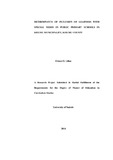| dc.description.abstract | This study sought to investigate determinants of inclusion in public primary
schools in Kisumu municipality, Kisumu County, Kenya. It was conducted in
24 out of 118 schools in Kisumu Municipality. Five research objectives were
set to guide the study. Specifically the study sought to establish the extent to
which teachers are equipped with knowledge to teach learners with special
needs, to assess teachers‟ and learners‟ attitudes towards inclusion of learners
with special needs, to establish the extent to which availability of facilities and
resources influence inclusion of learners with special needs and to determine
the extent to which curriculum content supports inclusion of learners with
special needs. The target population for this study consisted of 24 head
teachers, 120 teachers and 240 learners. This study adopted the descriptive
survey design to find out determinants of inclusive education in public
primary schools. Simple random sampling was used in the study to select 24
headteachers, 120 teachers and 240 class 7 pupils as sample size. Data were
collected using questionnaire and an interview schedule. Data analysed
through frequencies, percentages and charts. The findings in the study were
that headteachers and teachers education in public primary schools. The
findings indicated that 65% of teachers had no training in SNE while another
96% indicated willingness to train in SNE. The physical facilities and
teaching/learning resources were found to be inadequate and inappropriate to
accommodate learners with special needs. It was also noted that schools
lacked assistive devices such as ramps and accessible toilets. The findings
indicated that 92% of teachers had a positive attitude as shown by the
appreciation of inclusion of learners with special needs in the regular schools.
However, 65% of the teachers had a problem of having pupils with special
needs in their classrooms. This is an indicator that a large number of teachers
still need to be sensitized on the important of inclusion. This is a challenge to
the Ministry of Education as it needs to come up with strategies on attitude
change. Further, the study revealed that the curriculum content does not
support inclusive education. Based on these findings, the study recommends
that the government should restructure teacher training college curriculum so
as to include areas of specialization in special needs. Kenya Institute of
Curriculum Development should also come up with curriculum that takes care
of all learners with special needs in all classes in the primary schools. The
Ministry of Education should provide additional financial support to facilitate
acquisition of specialized facilities and teaching/learning resources towards
inclusion. Sensitization programmes should be launched targeting „normal‟
learners who may still have negative attitude towards inclusion. The study
recommends a study on the emerging challenges faced by the stakeholders in
the implementation of inclusive education in public primary schools in
Kisumu Municipality. | en_US |

